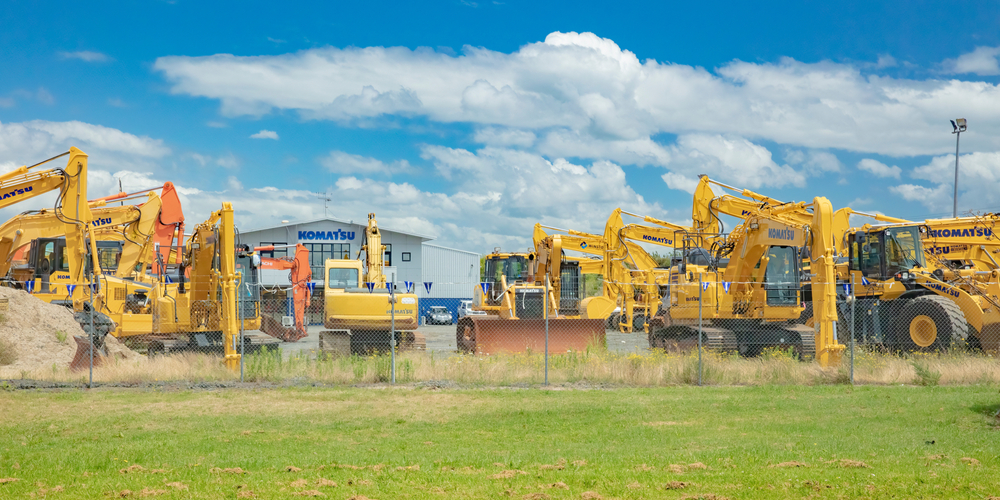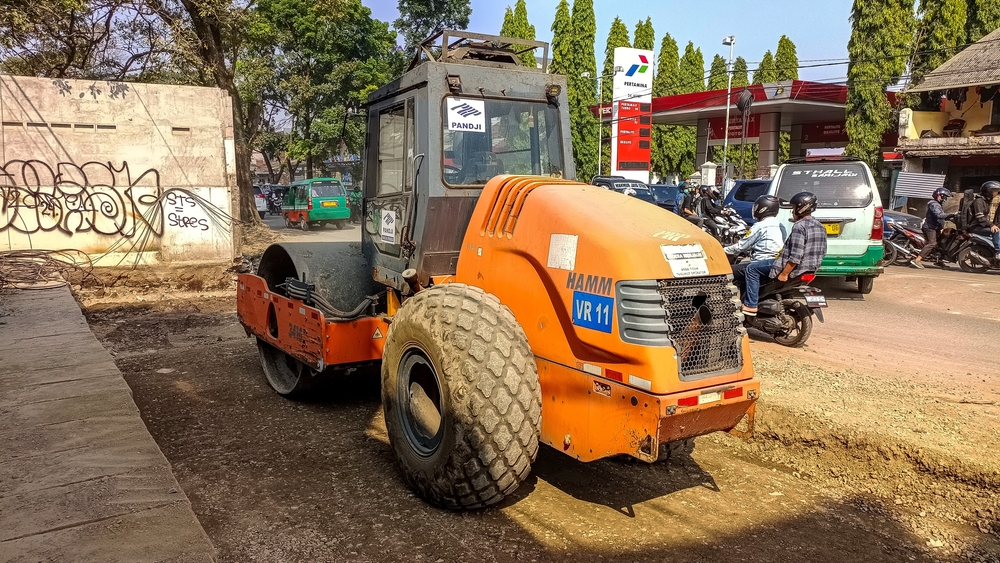The rapid advancement of construction technology has made sophisticated machinery a cornerstone of modern construction projects. Among this machinery, excavators stand out for their versatility and critical role in shaping infrastructure.
Far more than mere digging tools, excavators contribute significantly to the efficiency and success of projects across the globe, proving themselves as indispensable assets in the evolving landscape of construction.
What Does an Excavator Do? – A Deep Dive into Their Role in Construction
Excavators, with their versatile design and powerful capabilities, serve as the linchpin in a wide array of construction activities. Their role extends far beyond the basic expectations of excavation to encompass a comprehensive suite of tasks that underpin the success and efficiency of modern construction projects:
Digging and Excavation
This is the quintessential task of excavators, involving the removal of earth to create foundations for buildings, trenches for pipelines, and holes for landscaping purposes. The precision and power of excavators allow for quick and efficient digging, which is fundamental to the early stages of construction.
Material Handling
Excavators are equipped with various attachments like grapples and buckets, enabling them to handle and transport different materials across construction sites. This functionality is crucial for maintaining a streamlined workflow, allowing for the efficient movement of everything from soil and rubble to construction materials.
Demolition
With the addition of hydraulic breakers and crushers, excavators transform into powerful tools for demolition. They can systematically tear down structures, making way for new construction while ensuring that the process is controlled and safe.
Grading and Landscaping
Excavators can also be fitted with specific attachments that enable them to level ground, sculpt landscapes, and prepare sites for construction or rehabilitation. This versatility makes them indispensable for projects requiring precise grade levels and aesthetic considerations.
Heavy Lifting
The strength of excavators extends to lifting heavy objects, such as precast concrete elements, large pipes, and steel beams. This capability is vital for constructing infrastructure like bridges and buildings, where large components need to be moved into place with accuracy.
Snow Removal and Mining
In colder climates, excavators are often used for snow removal, showcasing their utility beyond traditional construction tasks. Similarly, in the mining industry, excavators are employed to move large quantities of material, demonstrating their adaptability to various operational environments.
River Dredging and Pond Cleaning
For projects involving waterways, excavators play a crucial role in dredging and cleaning, ensuring navigational routes are clear and maintaining the ecological balance of aquatic environments.
Technological Advancements and Innovations in Excavator Design
The construction industry’s ongoing evolution is paralleled by significant technological advancements in excavator design, enhancing their efficiency, safety, and environmental sustainability. These innovations not only redefine the capabilities of excavators but also demonstrate the construction sector’s commitment to progress and efficiency.
1. Automation and Robotics
The advent of semi-autonomous and fully autonomous excavator systems represents a leap forward in construction technology. These systems, powered by artificial intelligence and advanced sensors, can execute precise operations with minimal human input, reducing the risk of errors and enhancing safety on construction sites.
Robotic excavators can work in hazardous environments, perform repetitive tasks with consistent accuracy, and operate in conditions that might be unsafe for human workers.
2. Electrification
Electric-powered excavators are at the forefront of the industry’s shift towards sustainability. These machines emit zero exhaust pollutants and significantly reduce noise pollution, making them ideal for urban construction sites and environmentally sensitive areas.
The development of battery technologies and electric powertrains has made electric excavators more viable and efficient, paving the way for their broader adoption.
3. Improved Safety Features
Modern excavators are equipped with advanced safety features aimed at protecting operators and other construction site workers. These include 360-degree camera systems that provide operators with a comprehensive view of their surroundings, eliminating blind spots and reducing the risk of accidents.
Motion detection systems and proximity sensors alert operators to potential hazards, further enhancing site safety. Additionally, cabin designs have been improved to offer better ergonomics and comfort, reducing operator fatigue and the risk of injury.
4. Connectivity and Data Analytics
Connectivity technologies, such as IoT (Internet of Things) and telematics, have transformed excavators into smart machines capable of generating valuable data. This data provides insights into machine performance, maintenance needs, and operational efficiency, enabling fleet managers to optimize usage and reduce downtime.
Predictive maintenance, powered by data analytics, can anticipate mechanical failures before they occur, ensuring that excavators remain operational and productive.
5. Customizable Attachments and Tools
The development of specialized attachments has expanded the versatility of excavators. Hydraulic hammers, augers, rippers, and compaction wheels allow a single excavator to perform a diverse range of tasks, from drilling and breaking to compacting soil. Quick coupler systems enable operators to switch between attachments easily, increasing the machine’s flexibility and utility on different projects.
These technological advancements and innovations reflect the construction industry’s dedication to enhancing productivity, safety, and environmental stewardship through excavator design.
As these technologies continue to evolve, the capabilities of excavators will further expand, playing a pivotal role in the future of construction and infrastructure development.
Choosing the Right Excavator for Your Project
The success of any construction project is significantly influenced by selecting the appropriate equipment. When it comes to excavators, understanding the myriad factors that contribute to the optimal choice is crucial. Here’s a closer look at key considerations to guide your selection process:
Project Scope and Requirements
The nature and scale of the project are paramount in determining the size and type of excavator needed. Large-scale construction projects, such as infrastructure development or major land excavation, typically require heavy-duty excavators with larger buckets and higher horsepower.
Conversely, projects with limited space or minimal excavation needs, such as urban renovations or garden landscaping, benefit from mini or midi excavators that offer agility and precision without sacrificing power.
Site Conditions
The physical environment of the construction site plays a critical role in selecting an excavator. Crawler excavators, with their track-based movement, are better suited for uneven or muddy terrains where stability and traction are needed. Wheeled excavators, on the other hand, provide mobility and speed on hard surfaces, making them ideal for projects that require movement between sites or across urban settings.
Attachment Compatibility
The versatility of an excavator can be significantly enhanced by its ability to accommodate different attachments. When choosing an excavator, consider the range of tasks it needs to perform and ensure it is compatible with attachments such as hydraulic breakers, augers, or clamps. This flexibility allows for a more efficient use of the equipment across various stages of the construction project.
Technological Features
Modern excavators come equipped with a variety of technological advancements designed to improve efficiency, safety, and ease of use. Features such as GPS guidance systems, automated grading systems, and machine control solutions can streamline operations and reduce manual effort. Evaluating the availability and utility of these technologies is essential for maximizing the excavator’s contribution to the project.
Budget Considerations
Financial constraints are a reality for most construction projects, making budget an important factor in the equipment selection process. In addition to the initial purchase or rental cost, consider the long-term operating and maintenance expenses. Energy-efficient models, while sometimes more expensive upfront, can offer savings on fuel costs over time. Similarly, reliability and durability reduce the likelihood of costly repairs and downtime, providing better value in the long term.
Operator Skill and Training
The effectiveness of an excavator is also dependent on the skill and experience of the operator. Prioritize equipment that matches the expertise of your workforce or invest in training to ensure operators can fully leverage the excavator’s capabilities. Advanced features and controls can enhance productivity but require a proficient operator to realize their full potential.
Conclusion: The Future of Excavators in Construction
Excavators play an indispensable role in modern construction, offering unmatched versatility, efficiency, and technological innovation. As the industry continues to evolve, the capabilities of these machines expand, enabling safer, faster, and more sustainable construction practices. For construction professionals and companies like ESP, staying abreast of the latest excavator technologies and trends is not just beneficial; it’s essential for future success.
As we look to the horizon, the potential for excavators in transforming construction landscapes remains boundless. With advancements in automation, electrification, and safety, excavators are not just digging machines; they are the foundation upon which modern construction excellence is built.









